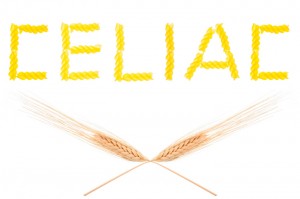5/7/13 blog post
a life with celiac disease - part 1
 Chances are at least one casual reader of this week’s Activities to Zucchini blog has celiac disease…and they might not know it. We hear of more and more people dealing with a diagnosis of this autoimmune condition. Since one of May’s health themes is Celiac Awareness Month, I wanted to devote the month of May to celiac disease (CD).
Chances are at least one casual reader of this week’s Activities to Zucchini blog has celiac disease…and they might not know it. We hear of more and more people dealing with a diagnosis of this autoimmune condition. Since one of May’s health themes is Celiac Awareness Month, I wanted to devote the month of May to celiac disease (CD).
The October 2012 study in American Journal of Gastroenterology found “The prevalence of CD in the United States was 0.71% (1 in 141), similar to that found in several European countries. However, most cases were undiagnosed.… CD was found in 35 participants, 29 of whom were unaware of their diagnosis “. This study’s results were about on target when compared to the actual incidence of 1 in 133.
What is Celiac Disease? Celiac Foundation says it well: “Celiac Disease (CD) is a lifelong inherited autoimmune condition affecting children and adults. When people with CD eat foods that contain gluten, it creates an immune-mediated toxic reaction that causes damage to the small intestine and does not allow food to be properly absorbed. Even small amounts of gluten in foods can affect those with CD and cause health problems. Damage can occur to the small bowel even when there are no symptoms present. “ In easier to understand terms, CD is a disorder where the body attacks gluten and makes a toxin that hurts the intestine. The damage can happen even without the person knowing about it.
What is Gluten? Gluten is the protein in grains that is harmful to people with CD. Only some grains contain gluten (wheat, rye, barley, triticale). Oats often contain small amounts of wheat so they need to be avoided, too.
What are the symptoms? Connecting your symptoms with CD can be a challenge.
- Common symptoms: diarrhea, abdominal (stomach) pain or bloating
- Less apparent symptoms: joint pain, anemia, tingling in feet and hands
Should I follow the diet if I suspect CD? No - one should not follow a Gluten Free Diet (GF) until after a positive diagnosis is made. Why? Following this diet will begin repairing the intestinal villi, the fingerlike projections in our small intestine that absorb the nutrients from our food. So, following the diet early would skew test results if one truly has Celiac disease.
Should I follow the diet to lose weight? This diet has become a hot one! People hope they lose weight, improve gut issues and eliminate autism by not eating gluten. However, people that must follow this diet for treatment of CD usually gain weight for they are now “repairing” their gut and can finally absorb (get) all of the nutrients from the food they eat. Many gluten free (GF) foods actually have more calories than non-GF ones. Following a GF diet eliminates great food sources that provide nutrients: fiber, iron and B-vitamins. I don’t recommend use of the GF diet for anything other than treating CD.
Why are more people being diagnosed with CD? Is there too much gluten in our diets? Does exposing babies to gluten early in age matter? Are we too clean of a society? Is there something wrong with our environment? Since a positive diagnosis can happen at any time in life, should we begin annual screening on everyone? There is not an answer as of yet. Research continues.
I hope you check back with Activities to Zucchini this month for more on CD. In the meantime, check out these helpful resources about Celiac disease:

